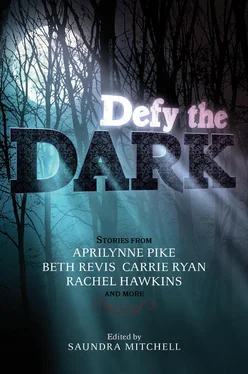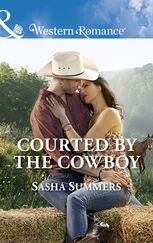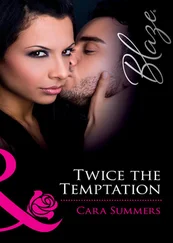Iam afraid of Ennor.
I am afraid that talking to her means I am crazy. I’m afraid she isn’t real, and I’m afraid she is.
And I am not afraid of her at all. She is the magic my father told me about. Talking to her makes me forget I am a miner, gives me a reason to look forward to going underground during the brightest part of the day.
Ennor herself is darkness to me—my helmet lamp flickers out whenever I step into the cavern. I’m left to imagine her face on every woman I see when I surface. I whisper confessions to Ennor, confessions a thousand times more honest than I’ve ever said in church, confessions that get deeper with each passing day. I can admit to anything—like not being able to see her means I also don’t have to see myself.
She tells me about her life. About how she lives underground—I don’t understand, really, but I listen. She tells me how the light would burn her skin, but how badly she wishes she could see things above the ground, like flowers and Ferris wheels. I describe them to her and she’s enchanted, delighted when I explain that carnival rides glow.
When I’m with her, I’m not afraid of the dark.
“Why do you hate the mine?” she asks one day, just as I step into the cavern and my helmet lamp goes out. I balance myself, dizzy from the sudden change in light.
“Because I don’t want to be a miner.”
“But you are .”
I shake my head and reach for the wall for stability, then lower myself to the floor.
“Not because I want to be,” I say. She sits next to me, her knee pressing against mine. She always touches me when we talk—a hand, her arm pressed against mine. It’s not intimate, exactly, though it felt strange at first—now it’s eye contact in the darkness. “It would be easier if I did. If I was like the rest of them and didn’t care that I might spend most of my life underground. If I was more like my father.”
“You don’t like it here?” Ennor asks gently, and I pause, trying to work out if there is hurt in her tone.
“I’m afraid here, sometimes,” I admit. “I’m afraid of suddenly being fifty years old and realizing that I haven’t seen the sun in decades. I’m afraid of not living up to my father’s reputation. And I’m afraid of getting covered up, of being trapped down here, where I don’t even think I’m supposed to be to begin with.”
“A cave-in,” Ennor says. “Like the one that happened when I was young.”
“Yes,” I answer, raising my eyebrows. “My father was caught in it. You know about it?”
“It’s my family’s job,” Ennor answers. “We protect the land and the mines, and if they’re respectful, the miners.”
“Your family’s job?”
“Yes. Some of the miners weren’t respectful like your father. He was a good man, my family says.”
Wait. Does she mean what I think she means? I take a deep breath before speaking. “What happened to the ones who weren’t respectful?”
Ennor sighs. “My family let the earth take them.”
My stomach twists like someone is tightening a bow in it. Yes, she means what I think she means. Roth’s face flashes through my head, my father’s, and finally the four who died, whose faces are memorialized in bronze at the center of town. My family let the earth take them.
I lean away from her and stand up, steady myself on the wall; I’m not sure if it’s the darkness or the knowledge that’s making me dizzy.
“Will?” she says, and my name sounds exotic on her lips.
“Your family caused that cave-in?” I ask. My tongue feels thick.
“Yes. But I didn’t do it,” Ennor says quickly. “I had nothing to do with it. Are you angry?” She sounds almost desperate as I move to duck through the doorway. “Why are you angry?”
I’m trying not to yell, but my voice is loud, bounces off the walls. “Because people died , Ennor! My father could have died.”
“My family protected him—”
“So I’m supposed to think it’s okay? What did the other miners do that was so disrespectful they deserved to die?” My voice is high, almost panicked.
“They killed us!” Ennor says, and she is yelling—her voice echoes up, shoots through the rock the same way her knocking does. “They blew up the mountain, killed a thousand years in seconds. They murdered the earth that had given them so much with explosives and fire. My family had to fight back!”
I freeze. When the mine is dried up and dead, they blow the “overburden”—the mountain itself—so they can excavate the little bit that’s left.
“They killed my father’s brothers and sisters. Four of them. So he took four miners. But it wasn’t me, Will,” Ennor says. I wonder how she looks when she’s sad. “It wasn’t me any more than it was you who killed my people.”
“It was still your kind.”
“And it was still your kind.”
“I’m not like them,” I say, though I feel ashamed as I say it. They’re good people, they’re my father’s people. I should be so lucky, to be like them, to be like my father. “They aren’t evil, Ennor.”
“Maybe we’re more like each other than them.”
I press my lips together, start to agree, but I can’t get over the image of my father walking out of the mine. Five days without food made him look gaunt, he was weak; Roth’s head was covered in dried blood. They were the lucky ones. I think about the cry of relief and sadness and joy from my mother’s lips as she ran to him. All because of the Knockers.
I can’t escape the image just yet. I duck through the doorway and go back to my station.
Ennor is no more responsible for killing miners than I am for killing Knockers. I know that. It takes a few days for my surprise and horror to fade, though, for me to stop wondering what would happen if I made her terribly angry, for me to stop cringing when I see miners spit onto the mine floor—does that count as disrespectful? Is it only a life for a life, or are the Knockers less tolerant now? I feel like a child torn between two parents—the miners, yanking me in one direction, and Ennor, yanking me in the other. I’m not sure if I’m more like either. I’m not sure what I should do.
But I know this much, at least—I don’t want Ennor to be mad at me. Not because she’s a Knocker, not because I’m a miner, but because she’s my friend. I don’t want to stop talking to her over something that happened more than a decade ago. So I buy her flowers.
It is very, very difficult to sneak a bouquet of roses, even a small one, into a coal mine. I shove them down my shirt and wince, wishing I’d purchased the de-thorned variety. I walk with a strange step as I try to keep the water dripping from the stems from running down my pant leg. The sound of the pink-and-white cellophane the grocery store wrapped the flowers in is thankfully masked by the fans in the retreaters’ area. I snake around the pillars and finally duck into our cavern for the first time since we fought.
“I brought you something,” I say as I enter, and am suddenly painfully aware of how ridiculous I sound. I feel like I did in high school, showing up to pick up my prom date: dressed strangely and like my tongue is too heavy for my mouth. I don’t hear her, and my helmet light is still on—I don’t like it; it feels like I’m exposing something sacred. I reach up and turn it off as I speak again. “Ennor? I’m sorry I left.”
Silence. I sigh, look down. Maybe her temper takes longer to settle than mine. Maybe I should even be afraid that I’ve disrespected her, and the mine could close in on me. I’m not, though. I don’t think Ennor would hurt me, any more than I would hurt her. I kneel to place the flowers on the ground, an offering that hopefully she’ll find later—
Читать дальше












